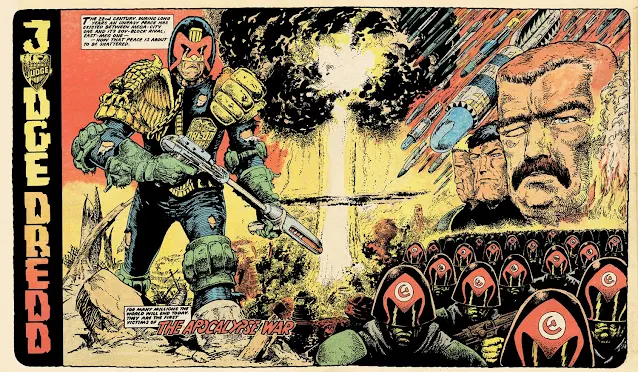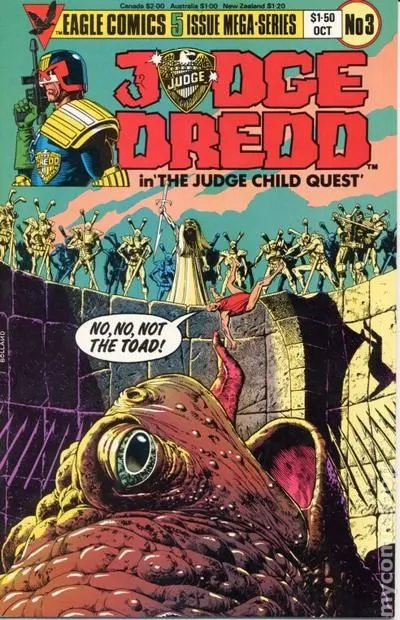Judge Dredd is a classic comic book character that
raises several ethical questions about the morality of justice, violence,
discrimination, the role of the state, and the influence of society on
morality.
Dredd operates in a dystopian world where there is no due
process (as the reader would see it), and he serves as both judge, jury, and
executioner. This creates a situation where one individual wields enormous
power, which raises questions about the morality of absolute justice.
Here are some themes that Judge Dredd operates under that attempt to address these tensions, they are often used as grim political allegory.
- Absolute
Justice
One of the most significant ethical questions raised by
Judge Dredd's character is the idea of absolute justice. Dredd operates in a
world where there is no due process or juries, and he serves as both judge,
jury, and executioner. This creates a situation where one individual wields
enormous power, which raises questions about the morality of absolute justice.
In the comics, we see several instances where Dredd's power
as a judge is called into question. In "The Apocalypse War," Dredd is
tasked with defending Mega-City One against a massive attack by the East-Meg
One. In the heat of battle, Dredd is forced to make some tough decisions,
including the use of lethal force against enemy soldiers. However, when he
discovers that his own side is using illegal weapons (due to chemically induced block mania) that are killing innocent
civilians, he turns against his own people, placing his commitment to justice
above his loyalty to the state.
- Use
of Force
Another ethical question raised by Dredd is the use of
force. Dredd often uses extreme force to stop criminals, including lethal
force. This raises questions about the morality of using violence as a means to
an end.
In the comics, we see Dredd using force in many different
situations, from stopping a mugger on the street to taking on entire criminal
organizations. In "The Day the Law Died," Dredd is faced with a
corrupt judge who has taken over Mega-City One and is using his power to
oppress the citizens. Dredd is forced to use deadly force against Judge Cal and
his minions to restore order and protect the people.
- Law
and Morality
Dredd's commitment to law and order above all else raises
questions about the role of morality in the justice system. Is it more
important to uphold the law or to act morally in a given situation?
In "The Judge Child Quest," Dredd is tasked with finding a young boy who is destined to be the next Chief Judge of Mega-City One. Along the way, Dredd is faced with several moral dilemmas, including whether to kill a giant mutated monster or spare its life. In the end, Dredd chooses to act morally and spare the monster, even though it puts him at odds with his fellow judges.
- The
Role of the State
Dredd's actions also raise questions about the relationship
between the state and the individual. Is it right for the state to have so much
power over the lives of its citizens, even if that power is used to maintain
order?
In "The Cursed Earth," Dredd is sent on a mission
to deliver vital medicine to the citizens of Mega-City Two, which has been
devastated by a deadly plague. Along the way, he encounters various factions, including
a group of cannibals who have taken over a city. Dredd is forced to use deadly
force to maintain order and complete his mission, but he also questions the
morality of the state's power to decide who lives and who dies.
- Discrimination
and Prejudice
Dredd's treatment of mutants and other marginalized groups
in the comic raises questions about discrimination and prejudice. Is it moral
to judge people based on their appearance or abilities, rather than their
actions?
In "The Day the Law Died," Judge Cal institutes a
policy of executing mutants on sight, leading to a massive uprising of mutants
against the state. Dredd is forced to navigate a complex moral landscape,
balancing his duty to uphold the law with his desire to protect innocent
mutants from discrimination and violence.
- Society
and Morality
The fact that Dredd is a product of his environment raises
questions about the influence of society on morality. Is Dredd inherently
moral, or is he simply following the rules of the society in which he lives?
In "America," we see the story of a young woman named America Jara, who becomes involved with a group of rebels who are fighting against the oppressive regime in Mega-City One. Dredd is tasked with bringing America to justice, but he begins to question his own beliefs and the society in which he lives.
Ultimately, Dredd realizes that his own morality and
sense of justice may not align with the laws of his society.
- Media
and Morality
Finally, the fact that Dredd is a fictional character raises questions about the role of media in shaping our understanding of morality.
Do fictional characters like Dredd influence our moral beliefs, or are they simply a reflection of existing moral norms?
In "The Pit," Dredd is tasked with cleaning up a
corrupt sector of Mega-City One, where judges and criminals have been working
together for their own benefit. The story explores the ways in which the media
can shape public perception of events and how individuals can use their power
to control the narrative.
Overall, Judge Dredd raises many important ethical questions about justice, morality, and the role of individuals and society in shaping our understanding of these concepts. The comics provide a rich and complex universe in which these questions can be explored, with many relevant examples to draw upon.
As readers, we are forced to confront these questions and consider our
own beliefs and values in the process.


















